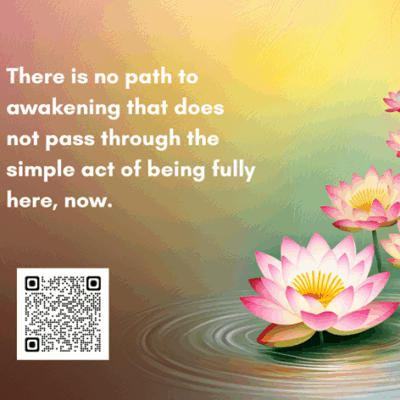“There is no path to awakening that does not pass through the simple act of being fully here, now.”
In Buddhism, awakening is not a distant goal found only in monastic isolation or after years of abstract study—it begins and ends in the immediacy of our present experience. The quote, “There is no path to awakening that does not pass through the simple act of being fully here, now,” reflects the essential Buddhist insight that liberation is discovered not through striving toward a future ideal but through wholehearted presence. The Buddha taught that mindfulness (sati)—the practice of attending deeply to each moment—is the gateway to insight, compassion, and freedom from suffering. Whether in the breath, a sip of tea, or the quiet between thoughts, awakening unfolds when we meet life as it truly is, without clinging, resistance, or distraction.
This perspective resonates strongly across traditions—from the Zen master’s emphasis on just this to Shinran’s humble entrusting to the present moment of nembutsu. Being “fully here, now” is the expression of our Buddha-nature, our innate capacity for wisdom and compassion. In fact, the path is not something we walk toward but something we realize we are already walking, when we turn our awareness inward and allow ourselves to be touched by the depth of now. To awaken is not to escape the ordinary, but to discover the extraordinary within it. Thus, the simple act of presence becomes the very heart of Buddhist practice.
Written by Guiding Dharma Teacher, Rev. G.R. Lewis, M.A.
© 2025 G.R. Lewis
All rights reserved
This article is intended for personal, non-commercial use only. No part of this publication may be reproduced, distributed, or transmitted in any form without the prior written permission of G.R. Lewis, except for brief quotations used for personal study. Contact him directly via our Contact Form.
